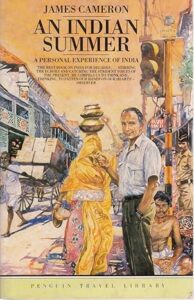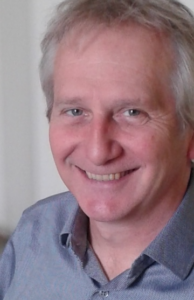Each month, we ask a member of faculty to tell us about one book that played an outsized role in making them who they are today. This month’s contribution to Words to Live By comes from Associate Professor of Journalism, David Swick. His choice reminds him of the powers of storytelling, great writing and finding the right book at the right time.
What book have you chosen?
 An Indian Summer, by the Scottish journalist James Cameron (1911–85). A lifelong foreign correspondent, Cameron saw three atomic bombs explode, knew Gandhi and other leaders, and travelled to dozens of war zones. India, though, was the place he liked best. In his late 50s, to his surprise, Cameron married—an Indian woman named Moni. After the wedding, they travelled India together for a summer. The book is good-hearted, insightful and at times brilliantly funny.
An Indian Summer, by the Scottish journalist James Cameron (1911–85). A lifelong foreign correspondent, Cameron saw three atomic bombs explode, knew Gandhi and other leaders, and travelled to dozens of war zones. India, though, was the place he liked best. In his late 50s, to his surprise, Cameron married—an Indian woman named Moni. After the wedding, they travelled India together for a summer. The book is good-hearted, insightful and at times brilliantly funny.
How and when did you come across this book?
I found it in India in 1994, in a makeshift bookstore, a room in the back of someone’s tiny house. There were a few dozen Danielle Steele-type romance novels, some Clive Cussler-style adventure novels—and then the Cameron. I don’t read the back covers of books because they can give too much away, but a drawing of him on the front caught my eye. He looked knowledgeable, kind and mischievous—a rare mix. He looked like someone I wanted to know.
What was it about the book that first stood out to you?
The writing. Cameron’s writing is as smooth as chocolate pudding. His voice is conversational; it sounds like he is merely chatting. But layers of thought, street smarts and erudition all fit into a delicious flow.
My Great Aunt June always said, “If we are paying attention, the right book often shows up at the right time.” Cameron came into my life at just the right time.
How did the book shape you?
 I love storytelling, and have spent much of my professional life during 25 years of full-time journalism and now at school pursuing the answer to this question: how can journalists tell true stories that are as compelling as great novels and movies? Cameron uses the novelist’s techniques of developing characters and creating scenes. His writing has tone; his words are precise.
I love storytelling, and have spent much of my professional life during 25 years of full-time journalism and now at school pursuing the answer to this question: how can journalists tell true stories that are as compelling as great novels and movies? Cameron uses the novelist’s techniques of developing characters and creating scenes. His writing has tone; his words are precise.
I define great writing this way: it is when the meaning and sound of words combine to create beauty and power. Meaning and sound. There is a musicality to great writing, which is why we say that great writing “sings.” Cameron sings.
What do you think it is about this book that made such an impact?
Partly it was the fun context: finding it down a goat track outside an obscure village. At that time, too, I was starting to get more deeply into literary journalism, i.e. excellent and immersive long-form nonfiction. Cameron offers a delightful example of how to connect with readers while staying honest and accessible.
Have you reread this book? Does it resonate differently today than it did on first reading?
Yes, I reread it just a few months ago. A British colleague and I are now working on our fourth academic anthology; this one is called Literary Journalists Explore Death (Routledge, 2026). Sixteen professors around the world are writing chapters that will consider how journalists have written about death by accident, death at war, death by murder, death in hospices and hospitals, death by suicide and execution, etc.
I was wondering what to say in the introduction and thought, wait a second, didn’t Cameron explore his own impending death at the end of An Indian Summer? So, I reread the book and yes, in the last 26 pages, he is lying in a hospital bed, talking in an intimate tone about his raucous, lonely, joy-speckled, helter-skelter life. Drifting in and out of consciousness, he says, “Most of the time I gave no thought to anything at all: darkness alternated with light; there were moments when I felt the sense of liberation that comes to very sick people in kind and professional care: that somehow a burden had been taken away, that no further desperate effort could be required of me again … This was a new relationship between myself and my physical shell, at the same time a relief and yet deeply grievous … It was hard to say why this should be. No more midnight telephone calls, no more desperate dashes to the airport, no more futile and frightened pursuits of the gunfire, no more brief encounters foolishly resolved; had I not always waited for this day?”
I was thrilled to read it again. After Cameron came into my life, I read all of his books, and have twice presented papers on aspects of his work to international conferences, in 2015 in Paris and this past spring in Australia. Reading him again was like enjoying a visit with an old and wise friend.

